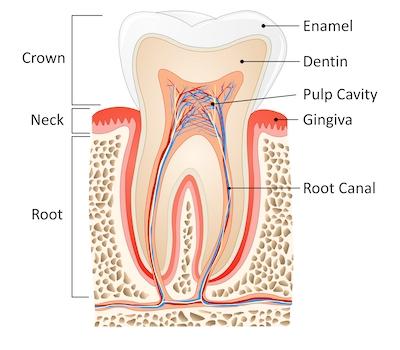
Root canal therapy often conjures dread, especially for those who have never had one or haven’t had a modern root canal treatment in Topeka, KS.
Of course, there are a lot of rumors about this therapy, notably that it’s complex and painful. Fortunately, the reality is much different.
The truth: Root canal therapy is straightforward, painless, and relieves swelling and discomfort. Without this treatment, the pain would worsen and put your teeth at risk for loss. A tooth root infection that requires this therapy is considered a dental emergency.
Causes of Tooth Canal Infections
Tooth canal infections mean bacteria have traveled to the center of your tooth, where the pulp and nerves live. Bacteria can reach the canal through the following:
- Injury or trauma to the tooth
- Cracked tooth or restoration
- Untreated decay that spreads to the canal
Signs and Symptoms of a Tooth Canal Infection
Most of the time, if you have this infection, you’ll call the dentist for an emergency visit to remove the pain and swelling, the most common symptoms.
In rare cases, this infection causes only mild discomfort because the tooth nerve is damaged or the condition is emergent.
In either case, it’s essential to contact your emergency dentist in Topeka, KS, if you notice any of the following symptoms:
- Toothache
- Tooth sensitivity that doesn’t improve
- Jaw or face swelling
- A bump or blister on the gum
- A discolored tooth
You don’t have to have all the symptoms to be diagnosed with a tooth canal infection, but failure to diagnose and treat this condition can result in losing your tooth.
What Is Root Canal Therapy?
Root canal therapy is a way to remove deep tooth infection and inflammation that has traveled to the tooth’s center. It is often the only thing preventing necessary extraction.
Additionally, it prevents infection spread, which poses a risk to other teeth.
The Root Canal Procedure
The procedure is a series of steps.
#1 Diagnosing the Infection
If you have root infection symptoms, your dentist will assess the tooth to make sure. This typically includes a visual exam and x-rays.
#2 Treating the Infection
After concluding that you have a tooth canal infection, your dentist numbs the area around the tooth, creates a tiny access point, and removes the infected material from the canal. We rinse and seal the tooth before sending you home.
You may notice slight discomfort after the numbing agent wears off. You can treat this with a medication like ibuprofen.
#3 Restoring the Tooth
You come in for a tooth-colored filling or dental crown at a future appointment. Typically, we use a dental crown to protect the tooth from future damage. If your dentist recommends a filling instead, the infection was minor and caught early.
A dental crown is a custom cap cemented over your tooth to the gumline. It looks identical to unrestored teeth.
Benefits and Results of Root Canal Therapy
A root canal saves your tooth from loss and prevents infection from spreading, which poses a severe risk to neighboring teeth. The treatment also relieves pain and swelling by treating the infection and restoring oral health.
The results are a pain-free smile and peace of mind!
Lowering Your Risks
 Preventive dentistry lowers your risks for most oral health conditions. It is also a way to detect issues early before they cause pain or put your teeth and gums at risk. Prevention means less chance of cavities, gum disease, and oral infections.
Preventive dentistry lowers your risks for most oral health conditions. It is also a way to detect issues early before they cause pain or put your teeth and gums at risk. Prevention means less chance of cavities, gum disease, and oral infections.
Besides in-office prevention, you should brush and floss daily—brush at least twice and floss once at a minimum. Of course, brushing and flossing after every meal is even better. When you brush, be sure to clean every tooth on all sides. And always use a fresh section of dental floss for each pass-through.
If you are athletic, always wear a mouthguard to practice and during games. Also, talk to your dentist if you suspect bruxism (teeth grinding).
Your Topeka dentist or hygienist can provide further tips to help you achieve and maintain a healthy smile, thereby lowering your risks for complications.
For Gentle Root Canal Therapy Near Me, Contact Us
A toothache means something is wrong. If you have tooth pain and/or swelling, it’s essential to contact our dental office as soon as possible to schedule an emergency visit with the dentist. We also encourage you to talk to a team member about our membership plan if you don’t have dental insurance.
